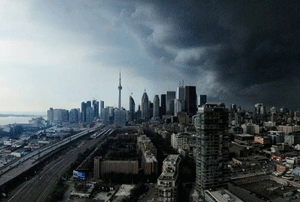 It's been only a few weeks since the Alberta floods; the floods at the end of June since confirmed by the Government of Alberta as the worst in Alberta's history. Now, less than 2 weeks later Toronto is breaking its own one-day rainfall records causing floods, commuter chaos and widespread blackouts.
It's been only a few weeks since the Alberta floods; the floods at the end of June since confirmed by the Government of Alberta as the worst in Alberta's history. Now, less than 2 weeks later Toronto is breaking its own one-day rainfall records causing floods, commuter chaos and widespread blackouts.
Canadian Flooding Disasters
Insurance claim payouts suggest that foul weather, like that seen in Toronto and in Southern Alberta this summer, is becoming increasingly more common, "Losses from natural catastrophes in Canada are rising. Claim payouts from severe weather have doubled every five to ten years since the 1980s."
Canadian Floods: A Not So Distant History
Coast-to-coast, Canadians-in recent times-have been weathering big-scale, and big-ticket storms.
- City of Toronto, Ontario: July 8, 2013. An estimated 126 millimetres of rain fall at Toronto's Pearson Airport breaking the record set back in 1954 when Hurricane Hazel poured 121 mm of rain on the city.
- Southern Alberta floods: June 20th, 2013. Whole communities were evacuated, with an estimated 100,000 being forced to leave their homes.
- Saint John River, New Brunswick: In May, 2008, New Brunswick saw its worst spring flooding in 35 years, causing $50 million or more in damages to homes, farms and small businesses.
- Peterborough, Ontario: On July 15, 2004, the City of Peterborough recorded a record rainfall of 175 mm of which 78.8 mm fell during a one hour period.
- Winnipeg, Manitoba: Winnipeg is no stranger to severe flooding. Manitoba floods in 2011, 2009, 1997 and 1950 have caused substantial damage.
- Chicoutimi, Quebec: In mid-July, 1996, torrential rains caused flooding and mud slides in Quebec's Saguenay River valley. The Saguenay Flood has the dubious distinction of being labeled Canada's first billion dollar natural disaster.
It's estimated, that every year, the Canadian insurance industry pays $1.7 billion each year in claims due to water damage.
Water Damage And Your Home Insurance
Water damage is a complicated issue. The cause of the flood will determine whether or not you're covered for damages to your home.
Damage resulting from an overland flood
Is not covered. Overland flooding usually occurs when water breaches its normal confines and overflows onto nearby land, usually due to heavy rainfall, or a sudden melting of ice and snow.
Why is overland flooding not covered?
The Insurance Bureau of Canada explains: "Overland flooding and seepage can't be covered by home insurance because it is only a risk for the small percentage of the population who live in a flood plain. Since the purpose of insurance is to spread risk among many policyholders, flood insurance for those at risk would be unaffordable."
Although overland flooding is not covered, it may cause a sewer back-up which is covered (so long as you've purchased the sewer back-up endorsement).
Damage resulting from sewer back-up flooding
Is covered, so long as your home insurance policy includes the sewer back-up endorsement. Sewer-back up coverage is worth it, especially if you live in a low-lying area.
It's also beneficial for people who live in cities with combined storm and sanitary sewers...cities like Toronto where there are three types of sewers:
- Sanitary sewers which carry wastewater (sewage). It's connected to a home's plumbing, and leads to a wastewater treatment plant.
- Storm sewers which carry stormwater from street drains, connected downspouts, and weeping tiles. These sewers carry the water into nearby watercourses, and ultimately Lake Ontario.
- Combined sewers which carry both wastewater and stormwater. Common in older parts of the city, stormwater and sewage are collected in the same pipe.
Combined sewers can be quickly overloaded with rainfall volumes like those seen on July 8th and back-up into the basements of Toronto's homeowners.
Water Damage And Your Car Insurance
If your auto insurance policy includes comprehensive coverage then water damage is usually covered. What's comprehensive coverage? It's an optional coverage that provides for repairs to your vehicle that are caused by something other than a collision - like theft, vandalism, or weather.
Home insurance, water damage and floods: Learn more




